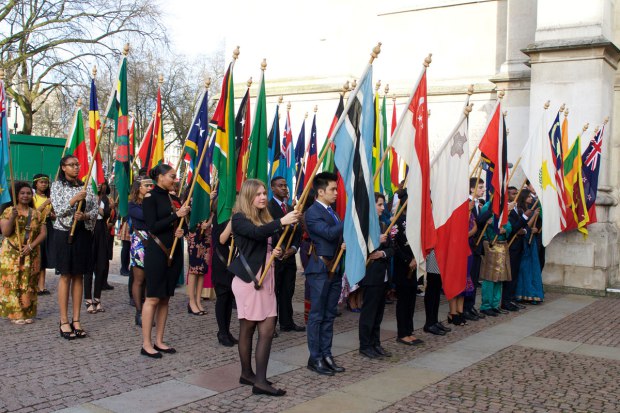March 12 marks Commonwealth Day and a religious service takes place celebrating the commitment of the Queen’s life as head of 53 countries. This is the time when the royal family gathered this year at Westminster Abbey
Commonwealth Day is a celebration of what we used to call the British Empire – and a day when the Queen gets off her backside and earns her crust for a change. But what is the point of this celebration, when does it fall annually and does it mean we all get a day off work? Here’s the low-down on that multinational phenomenon Commonwealth Day, formerly known as Empire Day.
Commonwealth Day is a celebration of the Commonwealth of Nations, and is held on the second Monday in March each year. This year it falls on Monday 12 March. The Commonwealth consists of 53 nations, including the coloniser Britain, plus 15 of its overseas territories. Sixteen of these states recognise the Queen as their monarch. Around 2.2 billion people are thought to celebrate this day, which represents about a third of the global population. In some parts of the Commonwealth the day is a public holiday, but it is not currently a public holiday in Britain.
The day consists of Queen Elizabeth II, who is Head of the Commonwealth, coming to Westminster Abbey for a multi-faith ceremony featuring a representative from each member state. Accompanied by Prince Philip and some of other posse members, the Queen delivers an address to her nations which is broadcast across the globe. This day was first celebrated in 1902 on the date of Queen Victoria’s birthday, January 22, and its original purpose was to be a ‘symbol of that unity of feeling… to those ideals of freedom, justice, and tolerance for which the British Empire [stood] throughout the world’. Empire Day was renamed Commonwealth Day in 1958, and its date was changed to the second Monday in March in 1974. In the UK, the Union Jack is flown from UK public buildings on Commonwealth Day, and the Scottish Parliament Building flies the Commonwealth flag too. The relevance of the Commonwealth in a postcolonial world has been the subject of debate in recent years.







